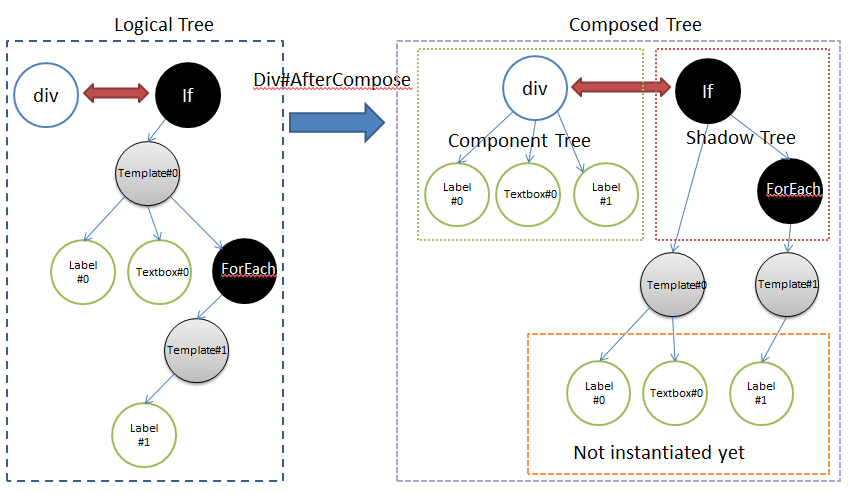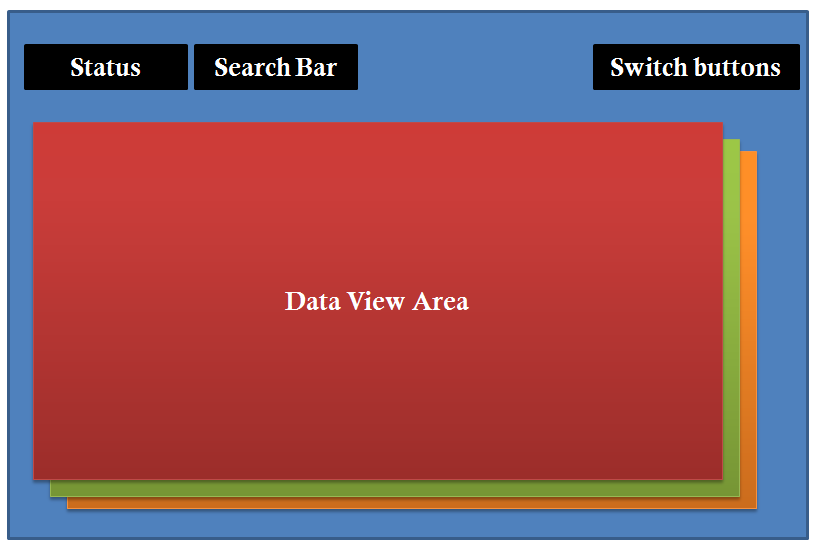ZK8 Series: UI Template Injection"
Jumperchen (talk | contribs) m |
Jumperchen (talk | contribs) m |
||
| Line 53: | Line 53: | ||
There are three classes used for this demo, ''DataListViewModel'', ''Item'', and ''Author'' as follows. | There are three classes used for this demo, ''DataListViewModel'', ''Item'', and ''Author'' as follows. | ||
[[File:ZK8_ZUTI_Class_Diagram.PNG]] | [[File:ZK8_ZUTI_Class_Diagram.PNG]] | ||
| + | |||
| + | They are all as normal as POJO objects except the ''DataListViewModel'' that provides two commands ''doChangeModel()'' and ''doFilterItem()'' for the View to use. | ||
== Main Layout Design == | == Main Layout Design == | ||
| + | In ZK 8, we enhanced the HTML parser to make it work with HTML or XHTML structure seamlessly. | ||
| + | As the demo video, we designed the main view into 4 parts, ''Status'', ''Search Bar'', ''Switch Buttons'', and ''Data View Area'', and the designer can separately design the layout into a pure HTML if he like to. And the application developer can more focus on the business logical once the designed page is ready, they can simply use the shadow element with some condiction and data annotation (i.e. ZK MVVM). We will explain it late. | ||
| + | |||
[[File:zk8_main_design.PNG]] | [[File:zk8_main_design.PNG]] | ||
== Layout Injection Parts == | == Layout Injection Parts == | ||
| − | + | Here we used is for the ''Data View Area'' to switch the three kind of the views with less than 10 lines. | |
<source lang="xml" high="2,3,5,9"> | <source lang="xml" high="2,3,5,9"> | ||
<div sclass="data-container"> | <div sclass="data-container"> | ||
Revision as of 10:19, 4 February 2015
Jumper Chen, Senior Engineer, Potix Corporation
February 3, 2015
ZK 8.0.0.FL.20150204
ZUTI 1.0.0.FL.20150204
Introduction
ZK 8 is moving to a next generation framework for application developer and web designer to cooperate with each other on a different aspect of the view while develop a webapp or website. The main feature of ZK 8 is to introduce a new Shadow Element concept, which is inspired from Shadow DOM to enable better composition of the ZK components and support with ZK DataBinding (MVVM) mechanism.
The built-in shadow elements are:
- Apply: an executable tags to allows you to choose which template to be applied, it will lookup the template inside-out recursively.
- ForEach: allows you to iterate over a collection of objects. You specify the collection using the items attribute, and the current item is available through a variable named by the var attribute.
- Choose/When/Otherwise: performs conditional block execution by the embedded <when> subtags. It renders the body of the first <when> tag whose test condition evaluates to true. If none of the test conditions of nested <when> tags evaluates to true, then the body of an <otherwise> tag is evaluated, if present.
- If: allows the conditional execution of ites body according to the value of the test attribute.
Note: you can customize your own shadow element if needed.
Shadow Element Concept
A shadow element is like a boilerplate template to help application developer to compose the html layout with some dynamic data, and the other hand the web designer can predefine the template or HTML page for application developer to use. In fact, the shadow elements are not visible while application developer to manipulate ZK components tree as explaining below.
For example,
<div>
<if test="${user.editable}">
User Name: <textbox value="${user.name}"/>
<forEach items="${user.phones}" var="phone">
<label value="${phone.name}"/>
</forEach>
</if>
</div>
As the diagram shown above, there are separated into two parts "Logical Tree" and "Composed Tree".
- Logical Tree is created by ZK page parser to construct a page definition tree and then instantiate it into a "Composed Tree".
- Composed Tree is also separated into two parts, one is component tree (green area) that used as same as usual before, and the other is the new concept (red area) shadow tree, which is not visible for application developer but component developer.
The shadow tree in the example above with EL expression won't be alive once the ouput is rendered to the client, that is because the shadow elements are not applied with dynamic data (like @load expression), so there is no reaean to store them in the server side to save the memory consumption.
Demo
In this demo, we will demonstrate how to layout 3 kind of data view (grid, list, and tree) with the same data set and Java code.
- [/_w/images/a/aa/2015-02-04_1629.swf for full size video]
There are three classes used for this demo, DataListViewModel, Item, and Author as follows.

They are all as normal as POJO objects except the DataListViewModel that provides two commands doChangeModel() and doFilterItem() for the View to use.
Main Layout Design
In ZK 8, we enhanced the HTML parser to make it work with HTML or XHTML structure seamlessly. As the demo video, we designed the main view into 4 parts, Status, Search Bar, Switch Buttons, and Data View Area, and the designer can separately design the layout into a pure HTML if he like to. And the application developer can more focus on the business logical once the designed page is ready, they can simply use the shadow element with some condiction and data annotation (i.e. ZK MVVM). We will explain it late.
Layout Injection Parts
Here we used is for the Data View Area to switch the three kind of the views with less than 10 lines.
<div sclass="data-container">
<choose>
<when test="@load(vm.mode ne 'tree')">
<forEach items="@load(vm.dataList)">
<apply template="@load(vm.mode)" item="@ref(each)"/>
</forEach>
</when>
<otherwise>
<apply template="@load(vm.mode)" item="@ref(each)"/>
</otherwise>
</choose>
</div>
Grid View Template
We can also apply the template from another page, for example it's a HTML based page (dataList_grid.zhtml).
<template name="grid" src="/templates/dataList_grid.zhtml"/>
Here is the content of the dataList_grid.zhtml file.
<div sclass="item mix" xmlns:n="native" xmlns:zul="zul">
<img sclass="center-block"
src="@load(c:cat3('/image/Centigrade-Widget-Icons/' , each.name , '-128x128.png'))" />
<n:div sclass="item-info">
<n:div>
<label sclass="item-name center-block" textContent="@load(each.name)" />
<n:span style="text-align: left" sclass="pull-left">
<img sclass="@load(c:cat('author-icon ', c:toLowerCase(each.author.name)))"
src="~./img/spacer.gif" />
<label textContent="@load(each.author.name)"
sclass="author-name z-label" />
</n:span>
</n:div>
</n:div>
</div>
List View Template
<template name="list">
<div sclass="item-list mix">
<n:span sclass="item-thumb">
<image sclass="item-icon" src="@load(c:cat3('/image/Centigrade-Widget-Icons/',
each.name , '-128x128.png'))" />
</n:span>
<n:span sclass="item-info">
<label sclass="item-name" value="@load(each.name)" />
</n:span>
<span style="text-align: left" sclass="pull-right">
<image
sclass="@load(c:cat('author-icon ', c:toLowerCase(each.author.name)))" />
<label value="@load(each.author.name)"
sclass="author-name" />
</span>
</div>
</template>
Tree View Template
<template name="tree">
<forEach items="@load(vm.authors)" var="author">
<n:div sclass="mix" style="display:block">
<span sclass="author-outline">
<image
sclass="@load(c:cat('author-icon ',
c:toLowerCase(author.name)))" />
</span>
<label value="@load(author.name)"
sclass="author-name" />
<n:div sclass="item-tree-items">
<n:div sclass="author-connector pull-left"/>
<forEach items="@load(vm.dataList)" var="item">
<if test="@load(item.author.name eq author.name)">
<n:div sclass="pull-left">
<n:span sclass="item-thumb">
<image sclass="item-icon"
src="@load(c:cat3('/image/Centigrade-Widget-Icons/',
item.name , '-128x128.png'))" />
</n:span>
<n:span sclass="item-info">
<label sclass="item-name" value="@load(item.name)" />
</n:span>
</n:div>
</if>
</forEach>
</n:div>
</n:div>
</forEach>
<if test="@load(not empty vm.authors)">
<span sclass="author-outline author-empty"></span>
</if>
</template>
Comments
| Copyright © Potix Corporation. This article is licensed under GNU Free Documentation License. |

